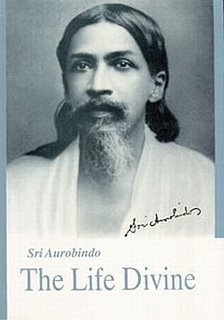 |
The Destiny of the Individual
Seeking God
In religious traditions, it is expected that the individual destiny should ideally be to seek God. One can seek God intellectually, dispassionately or through passion, devotion and love. One can be God’s devotee, instrument, servant, comrade, friend, and lover – even a divine paramour!
Identifying with God
How does one ‘realize’ God after seeking Him? One can do this by identifying with God. It is here that the difficulty arises. We have examined how ‘Reality’ or Brahman or the Being is perceived at three distinct poises – the ‘individual’, the ‘cosmic’ and the ‘transcendent’ (vide supra). Currently, the term ‘God’ is used to name the Transcendence. Now, if one identifies with ‘God’ or ‘Reality’ at the transcendental poise, one can get such an overwhelming experience that an identification with Reality at other poises (cosmic and individual) becomes unnecessary, secondary, insignificant and not worth the trouble!
|
|
Manifesting God
In Sri Aurobindo’s scheme of things, if one has to identify with God, then the identification has to take equal cognizance of the transcendental, cosmic and individual poises of the Reality. But Sri Aurobindo is not satisfied with a mere identification with the Reality at all levels. For him the crowning glory of the individual destiny is to MANIFEST the transcendence in individual, earthly terms.
Obviously, such a concept might seem blasphemous to some conventional schools of theology for whom the ‘impurity’ of the body does not permit it to be inhabited by the Divine effulgence. (In a workshop when a coordinator was pointing at her own heart to indicate that God was ‘inside’, the individual - an adolescent from a particular religion shouted and raised her fingers to show that God’s seat was above (The Transcendence) – the ensuing debate resulted in the respondent getting exasperated). However, Sri Aurobindo appreciates this standpoint too, for in his scheme, the manifestation of the Transcendence in the individual (who is ‘impure’) cannot succeed unless a ‘transformation’ of consciousness is initiated at the individual level. Thus the ‘MANIFESTATION’ of Transcendence in earthly terms necessitates a preparation through a ‘transformation’ of consciousness at the individual level. We shall see later that both these movements are necessary to each other. Of course the individual has to start this process by transcending the ego. Even then, Sri Aurobindo considers that an individual salvation (which starts by ego-surpassing) has no merit in earthly life unless the Transcendence manifests in the individual.
Sri Aurobindo points out another important consequence of this phenomenon. The conscious manifestation of the Transcendent in the individual automatically initiates the process of the ‘universal’ (cosmic) to become conscious of itself. Once a single individual is illumined, there is a ripple effect in the cosmic consciousness and other receptive and susceptible individuals also get stimulated. This means that the ILLUMINED INDIVIDUAL (who has transcended his ‘ego’) is necessary and imperative for the world-play. It has been traditionally held that the ‘extinction’ of the individual is an epitome of individual salvation. The individual is considered to be too small and insignificant when compared with the vastness of the universe and the grandeur of the transcendence. For Sri Aurobindo, the ‘extinction’ of the ‘ego’, which is a prime requisite for God-realization is not equated with the ‘extinction’ of the ‘individual’ – for Him; the ego-transcending ‘illumined’ individual is as important as the Transcendent Reality. ‘The individual is still necessary to the action of the Transcendent in the universe and that action in him does not cease to be possible by his illumination … If his inexorable removal through the very act of illumination is the law, then the world is condemned to remain eternally the scene of unredeemed darkness, death and suffering. And such a world can only be a ruthless ordeal or a mechanical illusion’ (The Life Divine, Pg. 45).
Vertical vis-a-vis Horizontal Expansion
In fact the ‘illumined’ individual does not selfishly move towards his own salvation in a vertical manner. Rather his consciousness influences his gestalt too and gets replicated in susceptible individuals scattered in time and space. ‘ The liberation of the individual soul is… the keynote of the definite divine action… It is the point of Light at which the intended complete self-manifestation in the Many begins to emerge. But the liberated soul extends its perception of unity horizontally as well as vertically. Its unity with the transcendent One is incomplete without its unity with the cosmic Many. And that lateral unity translates itself by a multiplication… The divine soul reproduces itself in similar liberated souls… whenever even a single soul is liberated, there is a tendency to an extension… Where shall we fix the limit of that extension? Is it altogether a legend which says of the Buddha that as he stood on the threshold of Nirvana, of the Non-Being, his soul turned back and took the vow never to make the irrevocable crossing so long there was a single being upon earth undelivered from the knot of the suffering, from the bondage of the ego?’ – (The Life Divine, Pg. 47)
The individual destiny is not to get obliterated in the vastness of the cosmos, not to get extinguished in the glow of the transcendence. If the ‘Transcendent’ is eternal while the ‘cosmos’ and ‘individual’ are ‘relative and phenomenal’, even then, ‘Brahman’ (The Being, The Reality, the Absolute) has consented to be represented in temporal terms just to experience the joy of self-manifestation in limited terms. ‘Brahman is in this world to represent Itself in the values of Life. Life exists in Brahman in order to discover Brahman in itself. Therefore man’s importance in the world is that he gives to it that development of consciousness in which its transfiguration by a perfect self-discovery becomes possible. To fulfill God in life is man’s manhood. He starts from the animal vitality and its activities, but a divine existence is his objective.’ (The Life Divine, Pg. 43)
He describes the individual destiny in poetic terms :
Bliss of Identity
All nature is taught in radiant ways to move,
All beings are in myself embraced.
O fiery boundless Heart of joy and love,
How art thou beating in a mortal’s breast
It is thy rapture flaming through my nerves
And all my cells and atoms thrill with Thee;
My body Thy vessel is and only serves
As a living wine-cup of Thy ecstasy.
I am a center of Thy golden light
And I its vast and vague circumference;
Thou art my soul great, luminous and white
And Thine my mind and will and glowing sense.
Thy spirit’s infinite breath I feel in me;
My life is a throb of Thy eternity.
Date of Update:
18-Nov-11
(Sri Aurobindo, Collected Poems, Pg. 142)
|

